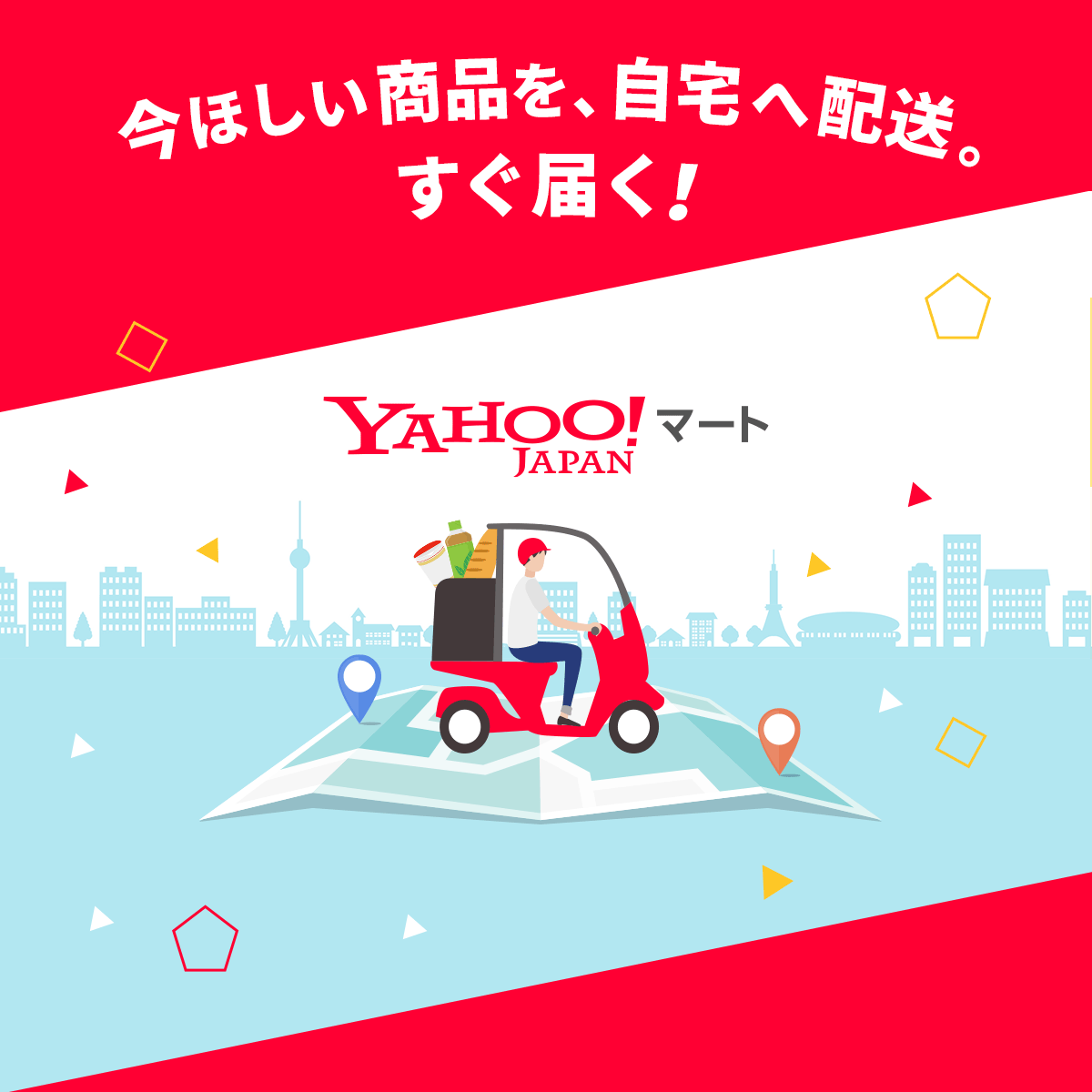Story Behind the Launch of Yahoo! JAPAN Mart, Demonstrating Synergies Within the Z Holdings Group
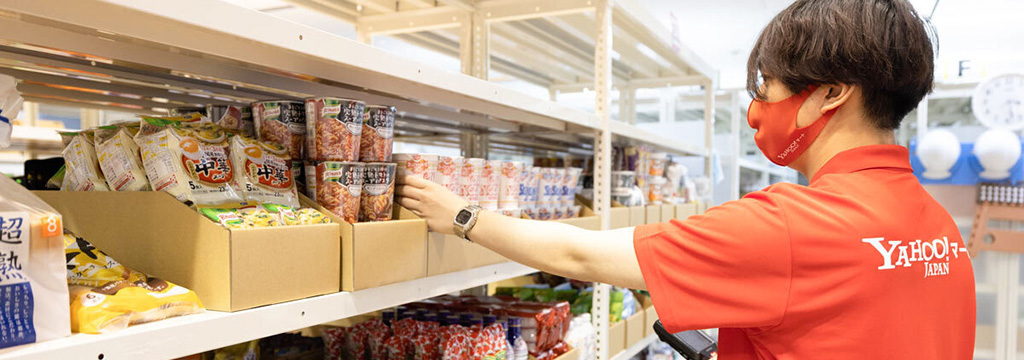

In January 2022, Yahoo! JAPAN Mart by ASKUL ("Yahoo! JAPAN Mart") was launched at eight stores in Tokyo, as a new business of Z Holdings Corporation ("ZHD"). Yahoo! JAPAN Mart is a Quick Commerce service that delivers products ordered from approximately 1,500 items in as little as 15 minutes. The service was made possible through the leadership of the ZHD Group companies: Yahoo Japan Corporation ("Yahoo! JAPAN"), ASKUL Corporation ("ASKUL") and Demae-can Co., Ltd. ("Demae-can").
To meet the rapidly growing expectations for Quick Commerce, the knowledge accumulated in each company, such as expertise and know-how, was elevated to launch a new business. After starting a demonstration experiment in July 2021, various barriers and challenges were overcome before the service could be commercialized. The four key persons talked about what the three companies did behind the scenes and what challenges they foresee for the future.
- The information on Yahoo! JAPAN Mart mentioned in the article are as of January 2022, and departments, job titles, etc., are as of March 2022.
INDEX
PROFILE

- Yuichiro TANAKAMARU (Yahoo Japan Corporation)
- After graduating from university, Yuichiro Tanakamaru joined a strategic consulting firm, where he was involved in strategy development and product planning focusing on the BtoC industry. He obtained an MBA from INSEAD while he was with the consulting firm. He joined Yahoo Japan Corporation in January 2015 and was assigned to the Corporate Development Division. As the Senior Manager in the Corporate Development Division of Yahoo Japan Corporation, concurrently serving as the head of the Investment Strategy Department of Z Holdings Corporation, he was involved in the capital and business alliance with ZOZO, Inc., business integration with LINE Corporation, development of various business strategies, and promotion of projects directly supervised by the management. Since December 2020, he has been the Chief of Staff to the COO (Chief Operating Officer) in Yahoo Japan Corporation, promoting projects led by the COO and serving as a discussion partner for the COO.
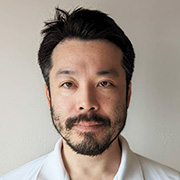
- Hideki NAKAO (Yahoo Japan Corporation)
- Hideki Nakao joined Yahoo Japan Corporation in 2018. After being involved in the launch of PayPay Corporation and PMI operations in ZOZO, Inc., he participated in the project for the Quick Commerce business. He is currently the Senior Manager of Quick Commerce Business Department, Business Promotion Office, Yahoo Japan Corporation.
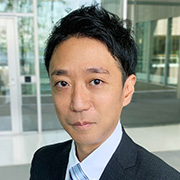
- Keisuke MURATA (ASKUL Corporation)
- After joining ASKUL Corporation in 2017, Keisuke Murata was engaged in the start-up of LOHACO, a marketplace-type e-commerce of daily necessities for consumers. He was subsequently involved in merchandizing planning and product strategy development for products directly delivered from LOHACO. Currently, as the business manager within ASKUL of Quick Commerce Business Department newly established in December 2021, he promotes product purchasing and procurement for the full-scale development of Yahoo! JAPAN Mart by ASKUL.

- Yoko KIYOMURA (Demae-can Co., Ltd.)
- Yoko Kiyomura joined a telecommunication venture company after graduating from university, where she gained experience in launching new businesses, working in technology and sales, and subsequently becoming a business manager. She then joined a consulting firm, where she was in charge of new business development and sales and marketing strategy support, before joining Recruit Sumai Company, Ltd. in 2013. There she was in charge of business planning and promotion of SUUMO rental and condominiums, etc. In May 2018, she joined the Corporate Planning Department of Yume no Machi Souzou Iinkai Co., Ltd. (currently Demae-can Co., Ltd.) and established the Sharing Delivery Division in September of the same year and was appointed as a General Manager.
Co-creation Ideas Realized within a Year through Smooth Collaboration
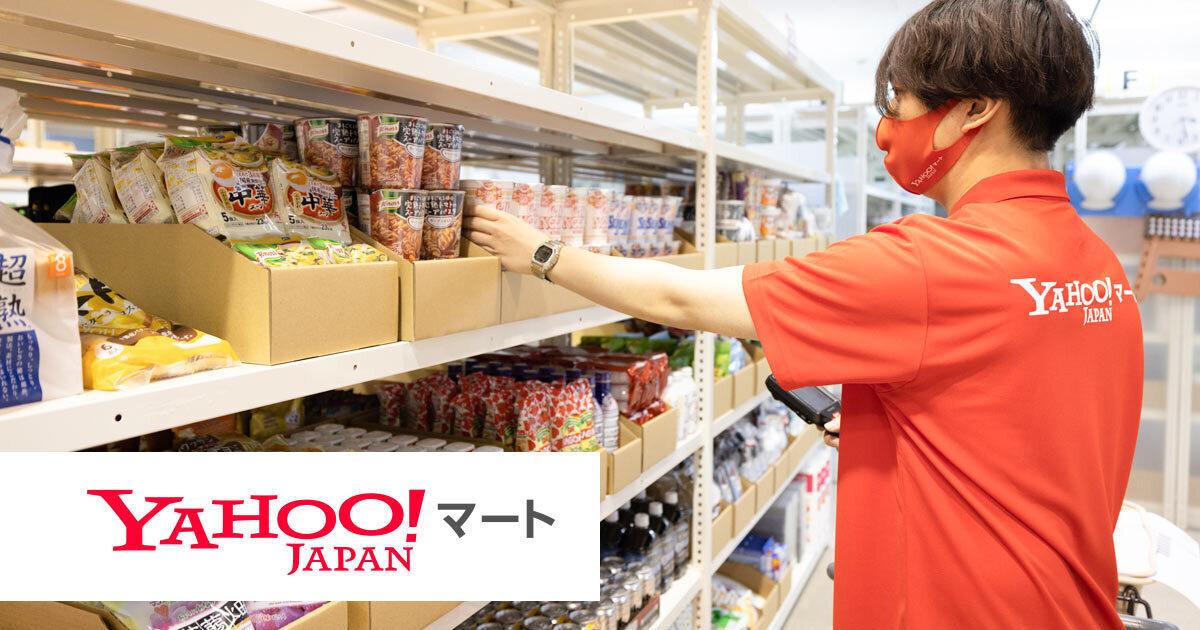
――First, please tell us about the background of the business concept that led to the launch of Yahoo! JAPAN Mart.
TANAKAMARU (Yahoo! JAPAN): Around February 2021, as we were exploring various ways to collaborate within the ZHD Group, Yahoo! JAPAN proposed ASKUL and Demae-can that we try a Quick Commerce service together. We thought that given the strengths and existing assets of ASKUL and Demae-can, we had all the necessary pieces for Quick Commerce. Specifically, we envisioned Demae-can to be in charge of the sales floor and delivery, ASKUL to be in charge of logistics and purchasing, and Yahoo! JAPAN to be the facilitator of the entire project. We thought that by having the three companies of the ZHD Group work together, we would be able to speed up the process of bringing the project into the market.
――In fact, you have gone from proposal to full-launch in less than a year.
TANAKAMARU (Yahoo! JAPAN): It was actually faster than we had expected. We began discussions in April 2021, and three months later, we were already able to open our first experimental store.
KIYOMURA (Demae-can): We had initially planned to open a store in the fall but sensing the entry of a competitor into the Quick Commerce market, we decided to move the opening up by about two months. I think we were able to do so because of the smooth collaboration within the Group.
――How did ASKUL and Demae-can respond to Yahoo! JAPAN's proposal?
MURATA (ASKUL): Although ASKUL had an interest in Quick Commerce which was growing quickly worldwide, we had no plans to commercialize it on our own. Therefore, we felt it was a great opportunity for us to receive a proposal for business co-creatidon within the ZHD Group. On the ASKUL side, we could leverage the supply chain management know-how that we have long accumulated, such as purchase and procurement capabilities, and we had high expectations for synergies that could be generated by combining the assets within the Group.
KIYOMURA (Demae-can): We, at Demae-can, also thought we could make use of the delivery network we had built throughout the 47 prefectures in Japan, and we accepted Yahoo! JAPAN's proposal positively. However, there were some challenges because we would be delivering not only food but also daily necessities. For example, we needed to construct a pickup operation and transportation method different from the conventional one since we had only been dealing with food delivery. Nevertheless, through discussions with Yahoo! JAPAN and ASKUL, we felt that most of the issues could be solved.
Synergies for Commercialization Generated through the Three Companies' Expertise and Cooperative Framework
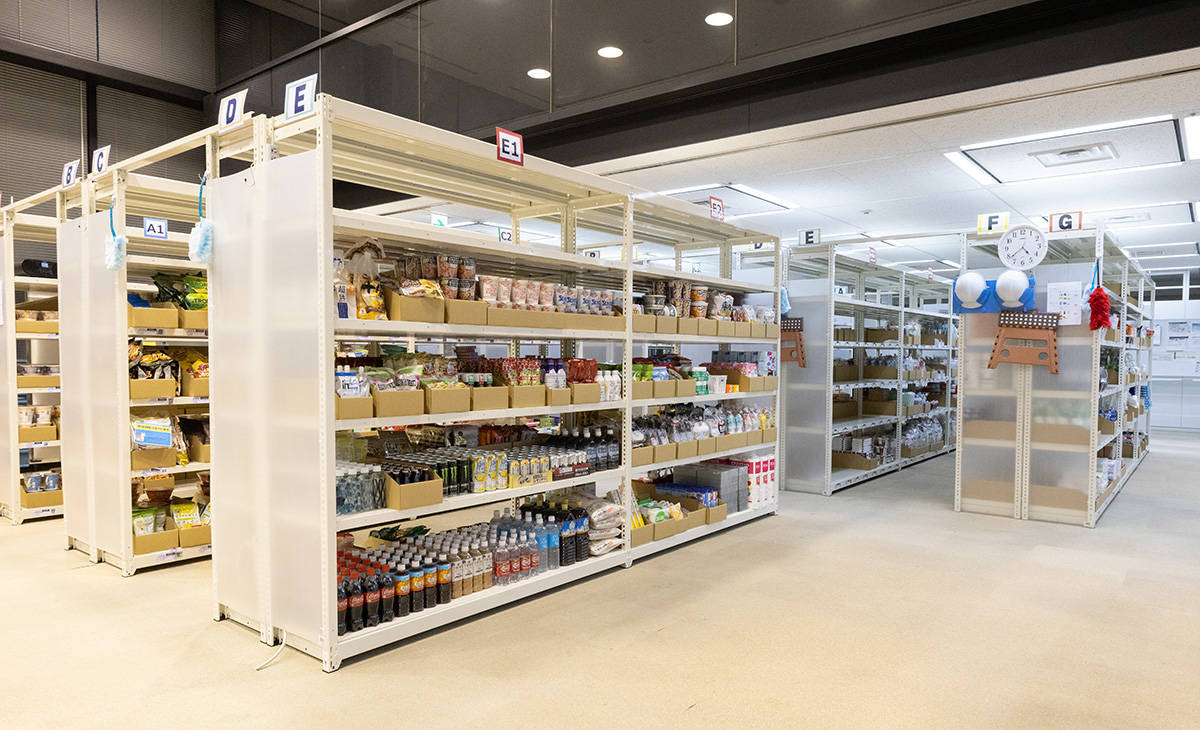
――What challenges did you face from demonstration experiment to full launch? Please tell from the standpoint of each company.
NAKAO (Yahoo! JAPAN): Although the division of duties for each company, including on-site operations, was decided relatively smoothly, we had some difficulty in organizing and coordinating in matters such as the hiring personnel and the types of contracts that would be concluded. In the phase of expanding the number of stores and service areas, Yahoo! JAPAN was also responsible for the construction and operation of the stores, and there we had a hard time finding properties. In fact, the entire Yahoo! JAPAN team is still involved in the process, from visiting real estate agencies to construction work, hiring human resources, training, and operations.
MURATA (ASKUL): For me, I have the impression that the hardest part was the launch of the first store. ASKUL operates large delivery centers across Japan and has its own logistics infrastructure. For Yahoo! JAPAN Mart, however, the establishment of a store that functions as a distribution center for end-users means that operations such as warehouse management, shelf organization, and cargo receiving will be completely different from the past. For instance, LOHACO's delivery center is approximately 43,000m2, but the first store was only 165 m2. Because of the extreme reduction in floor space, we had to construct the operation through much trial and error. It was tough, but I am glad we took on the challenge because we felt that we could apply the know-how and management schemes ASKUL had cultivated in our conventional distribution centers.
Kiyomura (Demae-can): Since Demae-can is the point of contact for orders, we focused on the website design, such as increasing the number of categories to match the characteristics of Quick Commerce, which has a larger number of products than usual. We also wanted to handle frozen products, so we had to work hard to verify delivery methods that would maintain product quality even on days with high temperatures. We spent a lot of time testing, for example, measuring how long the quality of the products would be maintained if a refrigerant was placed in Demae-can's delivery bag.
In order to realize the most important feature of Quick Commerce, i.e., the "immediate" in "immediate delivery," we also considered how we should set up the business and delivery area. The shorter the distance, the less time it takes to deliver, but on the other hand, if there are only a few destinations to deliver to, we have the dilemma of not being able to secure revenue. While receiving ideas from ASKUL, we conducted a series of tests to see if we could strike a balance by creating two types of stores: a regular store with many deliveries relatively close together, and a wide-area store that includes deliveries farther away.
Emergence of New Value - Some Customers Use the Service 70 Times a Month
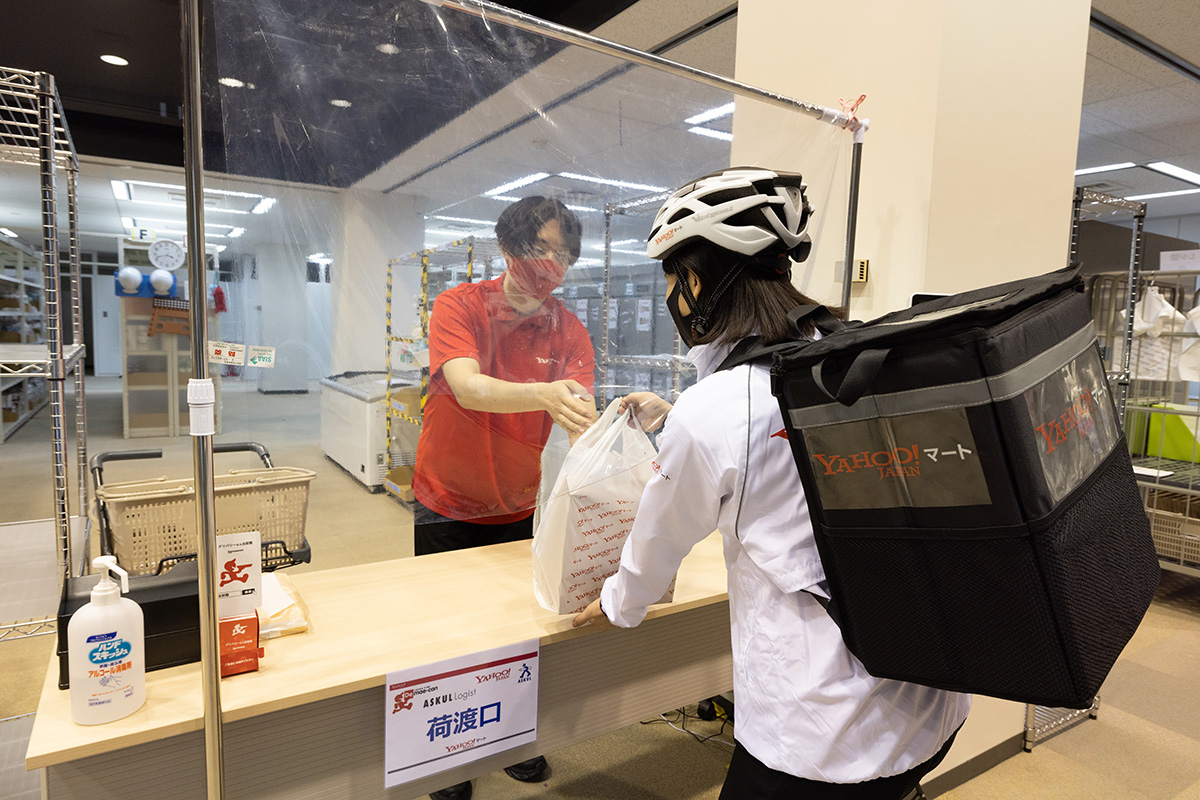
――What was the response to the launch of the first store? How did the response reflect in your expectations towards the Quick Commerce business?
NAKAO (Yahoo! JAPAN): The response was overwhelming. On the first day, we received so many orders that we had to temporarily stop accepting orders in the morning. Once again, we were convinced of the high demand for Quick Commerce.
MURATA (ASKUL): I also felt confident that we saw the winning strategy for Quick Commerce when we saw the response to the first store. Six months after the opening of the store, new customers continue to increase as a result of sales promotions, and at the same time, the revenue scale is expanding due to repeat customers. Repeat customers order on average once every three days, with some customers ordering as many as 70 times a month. We have received favorable reviews for the high level of convenience, and we feel that we are providing solid value to our customers. We are also seeing a lot of growth potential in terms of product strategy; the high-end boxed New Year dishes introduced at the end of the year sold out immediately, and the one-day-only bento fair of bento sold in different train stations and airports in Japan, was well received.
KIYOMURA (Demae-can): More recently, we are receiving positive feedback on Yahoo! JAPAN Mart from the delivery staff. We have an impression that the delivery staff is able to earn a steady income throughout the day because the delivery is not just meals. From these comments, we feel that we are providing a highly satisfactory service while focusing on the speed of commercialization.
――Do you think that the smooth division and coordination of roles among the participating companies contributed greatly to the realization of both speed and quality of the business?
NAKAO (Yahoo! JAPAN): I think so. We wanted ASKUL and Demae-can to fully demonstrate their capabilities in their respective areas of expertise, so Yahoo! JAPAN provided support mainly in terms of human resources. In particular, since the opening of the first store was moved up by two months, we had to speed up the search for property and construction work. Because Yahoo! JAPAN was able to be involved in this project as the actual operation team, I believe we were able to ensure the speed of progress for the entire project by actively eliminating the bottlenecks.
KIYOMURA (Demae-can): As Nakao-san said, it was great that we had a framework that allowed each company to do its best in its respective field. Demae-can's focus was on creating a smooth delivery operation model as quickly as possible. In the beginning, we had difficulties in picking items at the store and handing them over to the delivery staff, but through trial and error, we brushed up the operation.
Bringing Together the Ideas of the Three Companies to Expand Yahoo! JAPAN Mart
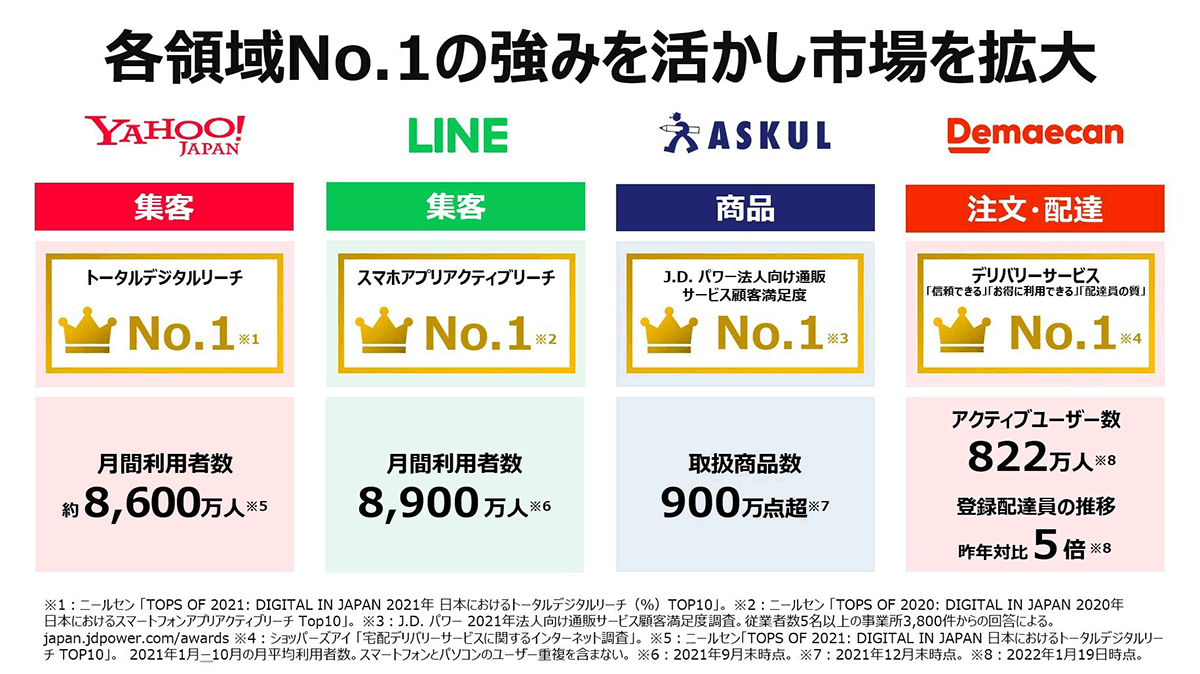
――Please share your enthusiasm for the future development of this service.
MURATA (ASKUL): We at ASKUL hope to expand "products that can provide added value to customers." There is still room for improvement in the current lineup, and that will be our immediate focus area. Also, we have been approached by some of our major suppliers who wish to offer their new products to Yahoo! JAPAN Mart, and so we would like to take advantage of our existing partnerships to promote new products and strengthen marketing.
KIYOMURA (Demae-can): Demae-can is in charge of building the platform for receiving orders and delivery. So, we would like to further refine the front-line operations so that we can respond smoothly even if the number of products increases in the future. We also want to turn the Yahoo! JAPAN Mart users into loyal fans by offering quality delivery services, including shorter delivery times. We will make efforts so that customers will want to make an order to Yahoo! JAPAN Mart again.
NAKAO (Yahoo! JAPAN): The service has just started, but I think there is plenty of room for evolution. In addition to expanding our product lineup and brushing up our delivery system, we would like to provide more value to our customers by reviewing the service itself as needed. To this end, Yahoo! JAPAN hopes to be a good facilitator and to continuously have discussions with ASKUL and Demae-can based on their expertise.
――The last question is to Tanakamaru-san. You have been watching the big picture and the development so far as the promoter of intra-group collaboration. I believe that ZHD will strengthen intra-group collaboration in various fields in the future, and this Yahoo! JAPAN Mart project must have been a big experience in that sense. What specifically have you learned from this experience?
TANAKAMARU (Yahoo! JAPAN): It has taught us many things, but there are three things that I particularly felt are important in intra-group collaboration projects. The first is to clarify the division of roles. I realized once again that it is very important to clarify at the outset the roles that everyone can agree on.
In this Quick Commerce project, there was actually not much room for discussion, and the role of each company was decided smoothly. Consequently, each company was able to concentrate on its responsibility, and subsequent adjustments could be made with minimal effort. I think that we were able to develop the idea into an actual business in less than a year, because we could devote all our energy to "bringing the value of Quick Commerce to end users as early as possible."
The second is to simplify the chain of command. In this project, we had one person as the overall project leader, and I believe that this has facilitated a smooth operation. If we had leaders from all three companies on equal terms, we might have been stuck in deadlocks due to subtle differences in their policies.
It was also significant that the person responsible was firmly committed to the project. Regular meetings were held once a week for the entire project with the project leader present. The presence of the person in charge clarified the vision and what needed to be done and gave us a sense of a larger picture to the discussions. This would not have been possible if the meetings were held by persons in the front-line alone.
The third point is to make the economic requirements simple. Generally speaking, when partnering with other companies, it often takes time to agree on the economic terms because we need to have many discussions and negotiations on the details. However, if the partners are in the same group, we can agree on the direction at an early stage and have a rocket start. Of course, there are various rules that we need to follow, and we may have to agree on further details later on, but the speed is key in the early stage of starting any new business. In that sense, I feel that the strength of being able to collaborate within the Group will become an advantage.
I feel that what we have learned from this experience is very significant. I am sure it will be of great use in future business co-creation within the ZHD Group.
